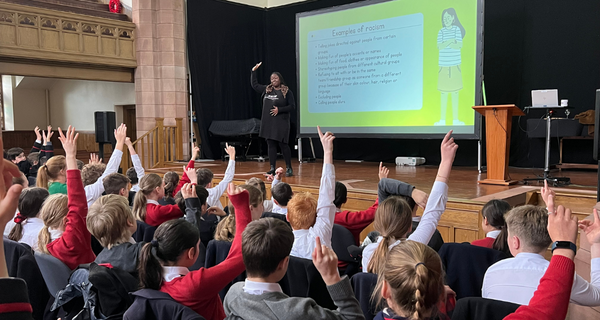This week Mpula Lawton, an educator, lawyer and founder of ARISE (Anti-Racism in Schools and Education) came to ESMS Junior School to talk to our students, teachers and parents about racism and the importance of being actively anti-racist. This is the first time Mpula has done a session in a Scottish school so we were lucky that she was able to make the journey to Edinburgh to talk to the children about racism and give them some important tools to help them challenge stereotypes, microagressions and other forms of racism they may encounter.
We asked Mpula to take a moment from her busy schedule to answer some questions for those parents in the community who weren't able to attend her virtual event and she was happy to oblige:
You began your career as a primary teacher and then a lawyer. What made you decide to set up ARISE?
I set up ARISE: Anti-Racism in Schools and Education as I recognised a gap regarding anti-racism training within the Education sector. I certainly had no anti-racism training when I did my PGCE, nor did many of my colleagues. As such, when racist incidents happened in schools, I noticed that not many staff members had the tools to recognise it let alone deal with it. As a Black teacher, I was on the receiving end of a lot of poorly handled racist incidents and always wished that my colleagues in the Education sector could have some training to better deal with such things. After working in Education for some time, I decided to try something new and therefore trained to be a barrister. Whilst I was at Law School, I learnt so much about the Equality Act 2010 and Human Rights. Just before the pandemic started, I put all of my personal, academic and lived experiences together and founded ARISE. The rest, as they say, is history.
What sort of things were you doing with the children at ESMS this week?
This week we did some fun and interactive workshops and assemblies. We discussed human rights, equality and recognising racism. We also looked at what it means to be actively anti-racist. The children heard stories about how racism can personally impact so many lives and left with the tools to not only do what is right but stand up for what is right.
How would you describe the difference between being anti-racist and actively anti-racist?
Being anti-racist is a statement. It’s passive and doesn’t achieve much. Being actively anti-racist is just that: it is active. It’s more than just words but a way of living your life every single day. Being actively anti-racist is about long-term change, accountability, being fearless and supporting real and meaningful change. It’s exactly what the children learnt in the ARISE workshops.
What can parents and teachers do to help children be actively anti-racist?
Talking to children about being actively anti-racist is a great first step, however, conversation alone isn’t enough. Children are incredibly receptive and pick up on your social cues, actions, and behaviours. Because of this, it’s important to think about how you as a parent or teacher feel about anti-racism. Having honest conversations with ourselves is important, as is reading, learning/unlearning, and talking to people who have lived experiences of racism. Once you have started to do these things, it is far easier to help children to be actively anti-racist. You can then begin to think about and incorporate concepts of anti-racism into your curriculum or home lives and create an environment that empowers children to be actively anti-racist.






